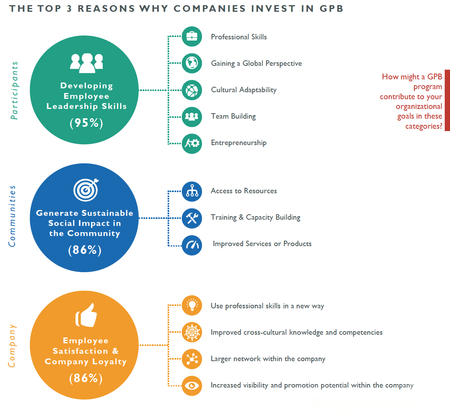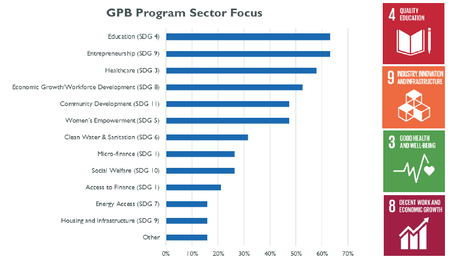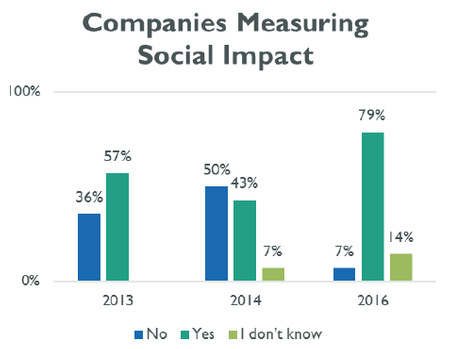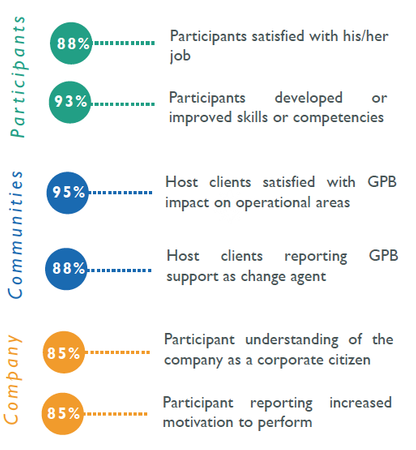Developing Global Leaders Through Service: Research Report on the State of the Practice of Corporate Global Pro Bono
08 Jan. 2018 | Comments (3)
Wouldn’t it be good if there was a business strategy which would build global leadership talent, improve company reputations, and make a positive impact on addressing global challenges? “Pro bono” is just such a strategy and it’s not just for lawyers anymore. Companies are increasingly utilizing Global Pro Bono (GPB) programs—an evolution of traditional pro bono programs putting the strategic, organizational and operational skills of corporations’ top employees to work to build capability and capacity in mission-driven organizations in underserved markets—to create shared value for the community and the business. That’s one of the key findings of the 7th “State of the Practice” of Corporate Global Pro Bono, published by PYXERA Global in November 2017.
Nearly 30 multinational firms from a wide range of industries have adopted Global Pro Bono programs in the last decade. Global Pro Bono serves as a way to help companies be more strategic and impactful with their corporate philanthropy, while at the same time developing their global leadership talent.


Other highlights of the report include:
Leadership development is still a leading driver Ninety-five percent of the companies surveyed identified leadership development as one of the top three reasons for investing in GPB. Numbers two and three were to generate sustainable social impact in the community (86 percent) and build employee satisfaction and loyalty (86 percent).
When IBM first approached CDC Development Solutions (now PYXERA Global) in 2007, it was looking for a way to accelerate the development of future global business leaders. Completing the transition to a truly global company required scores of managers to quickly acclimate to the requirements of managing business and people across borders. Traditional approaches, such as formal degrees or expatriate assignments, were deemed too slow and expensive. The IBM Corporate Service Corps—IBM’s GPB program—came out of that understanding. The program celebrates its 10th anniversary this year.
GPB programs address a wide range of societal needs The skills which corporate employees bring to bear in GPB assignments build capabilities for local organizations to address and respond to a wide range of community challenges, many of which align with the United Nations Sustainable Development Goals (SDGs). The survey found that programs align with at least a dozen of the 17 Global Goals, as the SDGs are also known, including quality education, good jobs and economic growth, innovation and infrastructure, health, gender, clean water and sanitation, and energy. This broad utility attracts corporations from multiple industries for impactful corporate social responsibility (CSR).
Measuring the impact is challenging and increasingly demanded Impact measurement is increasing in importance as companies face rising pressure to demonstrate return on investment. Since 2013, there has been a 40 percent increase in the number of companies measuring social impact and an 11 percent increase in companies measuring business impact. However, it remains one of the most challenging aspects of CSR in general, including GPB programs.


Partnership is key Partnership is at the center of every GPB engagement, because at its most basic level a company provides a host client with pro bono consultants who use their considerable expertise in service to that organization—it’s a micro private-public/social partnership every time. But increasingly, the partnerships have become broader and more important. Survey respondents noted that partnerships with other companies also augment their ability to serve, as demonstrated most clearly by the response to the Global Health Corporate Champions, an activity of the USAID’s Global Health Bureau’s Global Health Fellows Program II, which sends multi-company cohorts to build the capacity of indigenous healthcare organizations in emerging markets.
The cross-sector, cross-industry approach ensures diverse perspectives and approaches to achieve far greater impact than any single actor could alone.
Alumni now number in the thousands The first GPB report in 2010 requested information from participating companies dating back to 2008. Since then, more than 13,000 professionals from 29 companies have completed GPB assignments in 109 countries. The participants come from all over the world and they go over the world. Companies with headcounts from 2,000 to 500,000 employees have found the practice to be an effective “triple win”—for the participants, the organizations they serve, and the companies that send them.
To read or download the full report, click here.
-
About the Author:Gavin Cepelak
Gavin Cepelak is the Vice President of Global Pro Bono (GPB) at PYXERA Global where he leads teams in developing and overseeing the proper implementation of multiple corporate GPB programs throug…
3 Comment(s) Comment Policy




really good article and good blog.. thanks.. https://youtu.be/_KJqhkcuu-k
really very analysis.. good information.. thanks.. https://youtu.be/_KJqhkcuu-k
Great update. Leading edge trend